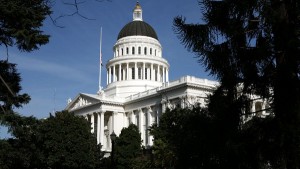A May 14 runoff is likely in the 32nd Senate District, although Democratic Assemblywoman Norma Torres of Pomona remains the favored candidate.
Democrats make up nearly half the voters in both districts, with about 28 percent registered Republican and a fifth of voters having no party preference.
If both current Assembly members win, either Tuesday or in May, Assembly Democrats will be temporarily short of the 54 seats they need for a supermajority. Moreover, they will lose Assemblyman Bob Blumenfield, D-Sherman Oaks, in July, when he leaves to join the Los Angeles City Council.
Assembly Democrats are unlikely to regain their supermajority until shortly before the Legislature adjourns in mid-September. Depending on the outcome and timing of special elections, they could lack their full two-thirds until early next year.
"It's an opportunity for the taxpayers to breathe a little bit easier for a couple of months," said Assembly Minority Leader Connie Conway, R-Tulare. "I think it makes a tremendous difference, in as much as even if they get there eventually, for right now we're able to hold them off."
The game of musical chairs merely postpones the inevitable, said Steve Maviglio, a spokesman for Assembly Speaker John Perez, D-Los Angeles.
"They're all Democratic seats. There's no risk. It's just a matter of when," he said.
Tuesday's election is to fill the seats vacated when Democratic Sens. Gloria Negrete McLeod of Chino and Juan Vargas of San Diego resigned to take seats in Congress, which they won last fall.
Senate Democrats also have a surprise vacancy created when Sen. Michael Rubio, D-Bakersfield, resigned last month to take a job with Chevron. The special election in the Central Valley's 16th Senate District will be May 21, with a special runoff election on July 23 if no candidate wins a majority in the primary election.
They also could lose Sen. Curren Price, D-Los Angeles, in July if he wins a May 21 runoff election for a Los Angeles City Council seat.
Conway and Senate Minority Leader Bob Huff, R-Diamond Bar, conceded that Hueso is likely to win a majority on Tuesday, but both said Ontario Mayor Paul Leon, a well-financed Republican, could force a runoff with Torres in the 32nd Senate District. There are four Democrats in the race, including Torres and San Bernardino County Auditor-Controller Larry Walker of Chino, and two Republicans including Leon.
Huff said Republicans also hope they can field a strong candidate to replace Rubio. Although about half the district's voters are Democrats, he said they have generally favored more limited government.
But he and Senate President Pro Tem Darrell Steinberg, D-Sacramento, agreed that Senate Democrats will regain their supermajority soon enough to advance any bills or constitutional amendments they choose.
Perez said the possible loss of the Democrats' supermajority in the Assembly will not affect his emphasis on working with Republicans to improve the state's economy and creating jobs.
"Obtaining the supermajority didn't change the world; temporarily losing the supermajority won't change the world," Perez said in a statement. "With or without the supermajority, I will continue to seek bipartisan support for major legislation."
Allan Hoffenblum, publisher of the California Target Book, which analyzes legislative and congressional campaigns, said the Assembly includes relatively conservative Democrats who will face tough re-election fights and are unlikely to support raising taxes.
"The supermajority was more of a psychological boost more than anything," he said. "It's more a reflection of how weak Republicans are in the state."
Democrats in both chambers will regain their two-thirds margins this fall or early next year, Hoffenblum said, just in time for next year's campaigns to begin.
